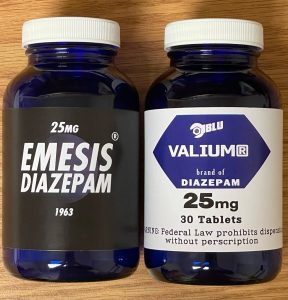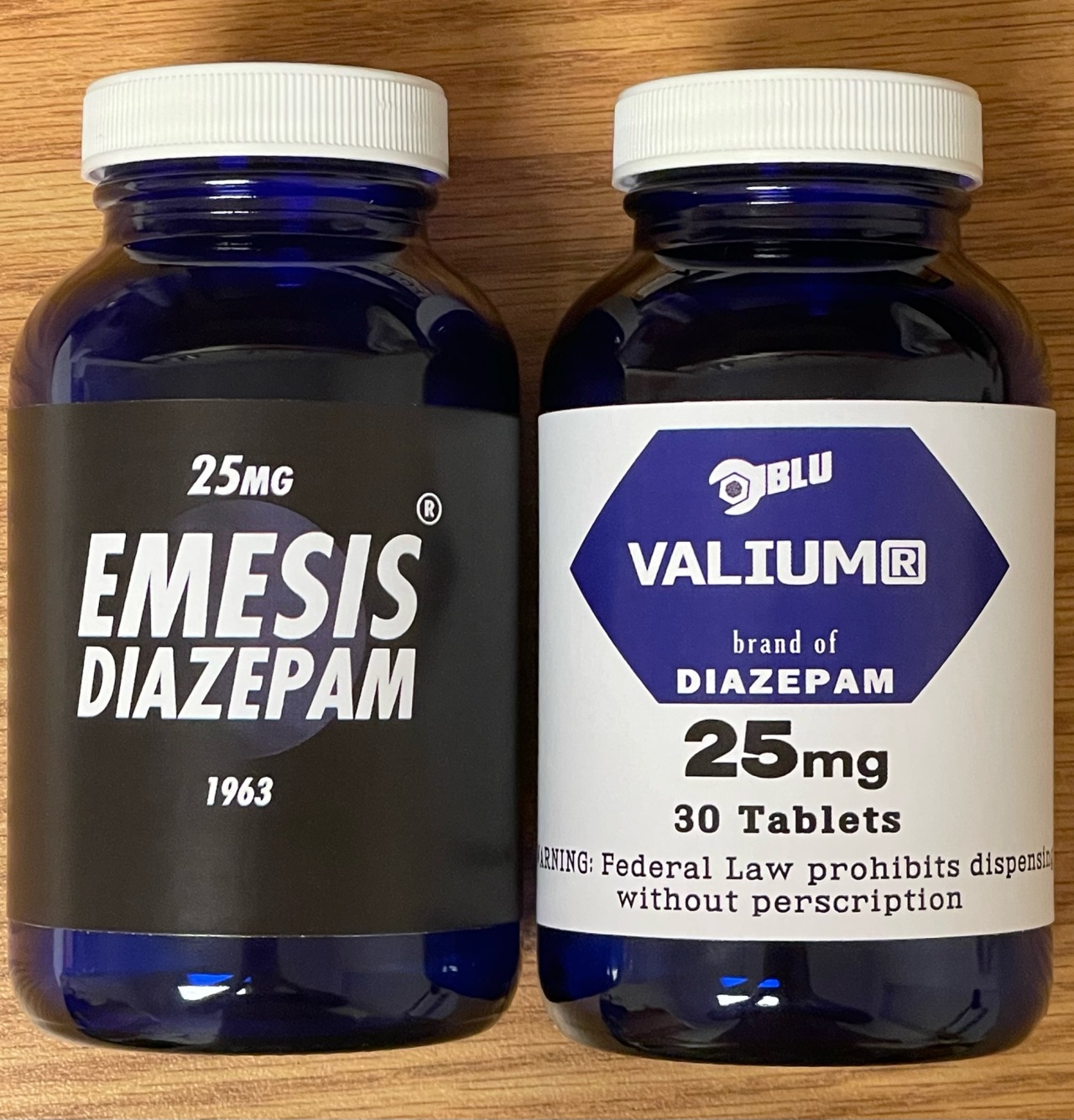Emesis diazepam
$250.00
Emesis and Diazepam: Understanding the Connection.
Description:
Emesis diazepam, commonly known as vomiting, is a reflexive action controlled by the brain to expel contents from the stomach. Diazepam, a benzodiazepine medication, is primarily prescribed for its anxiolytic, muscle-relaxant, and sedative properties. While diazepam is not primarily associated with causing or treating emesis, its effects on the central nervous system (CNS) can indirectly influence nausea and vomiting in certain scenarios.
This article explores the relationship between emesis diazepam, addressing common questions, potential side effects, medical uses, and safety considerations. By the end, readers will have a comprehensive understanding of how diazepam interacts with nausea and vomiting and its broader implications in medical treatments.
What Is Emesis?
Emesis, or vomiting, is the body’s defense mechanism to expel harmful substances or irritants from the stomach. It involves the activation of the vomiting center in the brain, which is triggered by various stimuli, such as toxins, motion sickness, or gastrointestinal issues.
Common causes of emesis include:
1. Food Poisoning
2. Motion Sickness
3. Pregnancy (Morning Sickness)
4. Infections
5. Medications or Drugs
While vomiting is often a temporary response, chronic or severe emesis requires medical evaluation to identify and address underlying conditions.

What Is Diazepam?
Diazepam is a benzodiazepine medication widely used for:
1. Anxiety Disorders
2. Muscle Spasms
3. Seizure Control (Including Status Epilepticus)
4. Alcohol Withdrawal Symptoms
5. Sedation Before Medical Procedures
It works by enhancing the effect of gamma-aminobutyric acid (GABA), a neurotransmitter that calms the nervous system. This leads to relaxation, reduced anxiety, and sedation. Although diazepam is not specifically indicated for treating nausea or vomiting, it may be prescribed in cases where anxiety contributes to these symptoms.
Can Diazepam Cause Emesis?
Emesis Diazepam is generally not known to cause emesis directly. However, some individuals may experience nausea as a side effect. Factors influencing this include:
1. Dosage: Higher doses may lead to nausea or dizziness.
2. Individual Sensitivity: Some people are more prone to gastrointestinal side effects.
3. Drug Interactions: Combining diazepam with other medications can heighten side effects.
While uncommon, nausea and vomiting associated with diazepam use should be reported to a healthcare provider, especially if persistent.
Can Diazepam Be Used to Treat Emesis?
Diazepam is not a primary treatment for emesis. However, in certain cases, it may indirectly help manage vomiting by:
1. Reducing Anxiety: Anxiety-induced nausea can be alleviated with diazepam.
2. Relieving Muscle Spasms: Conditions causing abdominal muscle spasms may benefit from its muscle-relaxant properties.
3. Sedation: In severe cases of nausea, diazepam’s sedative effects may provide relief.
For nausea and vomiting, medications like ondansetron or promethazine are more commonly prescribed. Diazepam is only considered in specific scenarios where its broader effects may benefit the patient.

How Does Diazepam Affect the Central Nervous System?
Emesis Diazepam works by enhancing GABA’s calming effect on the CNS. This results in:
1. Anxiolysis: Reduction of anxiety.
2. Sedation: Induction of sleep or relaxation.
3. Muscle Relaxation: Relief from muscle tension or spasms.
4. Anticonvulsant Activity: Prevention or control of seizures.
By calming the CNS, diazepam may help reduce symptoms like nausea that are linked to stress or overactivation of the nervous system.
What Are the Side Effects of Diazepam?
Common side effects of Emesis diazepam include:
1. Drowsiness
2. Dizziness
3. Fatigue
4. Nausea
5. Dry Mouth
Rare but serious side effects include respiratory depression, confusion, and dependency. Patients experiencing severe side effects, such as persistent nausea or vomiting, should seek medical attention promptly.
What Should You Do If Diazepam Causes Nausea?
If Emesis diazepam causes nausea or vomiting, consider the following steps:
1. Consult Your Doctor: They may adjust the dosage or switch medications.
2. Take With Food: Eating before taking diazepam can reduce gastrointestinal discomfort.
3. Avoid Alcohol: Alcohol can worsen nausea and other side effects.
4. Stay Hydrated: Drink plenty of fluids to prevent dehydration.
In most cases, mild nausea resolves as the body adjusts to the medication. Persistent symptoms require medical evaluation.
Are There Alternatives to Diazepam for Treating Nausea?
For treating nausea and vomiting, healthcare providers often recommend:
1. Ondansetron: A serotonin antagonist used for chemotherapy-induced nausea.
2. Promethazine: An antihistamine with antiemetic properties.
3. Metoclopramide: Increases stomach motility to reduce nausea.
4. Ginger Supplements: A natural remedy for mild nausea.
Diazepam is not typically used for nausea unless the underlying cause is anxiety or muscle spasms.
What Is the Role of Diazepam in Chemotherapy-Induced Nausea?
While Emesis diazepam is not a primary treatment for chemotherapy-induced nausea, it may be prescribed alongside antiemetic medications to:
1. Reduce Anxiety: Many cancer patients experience anxiety, which can worsen nausea.
2. Improve Sleep: Sedation helps patients rest, aiding recovery.
3. Complement Other Treatments: As part of a multimodal approach to symptom management.
Specialist advice is crucial when considering diazepam for cancer-related symptoms.
How Long Do Diazepam’s Effects Last?
Diazepam has a long half-life of 20–50 hours, meaning its effects can last for several hours or even days. The duration depends on factors like dosage, metabolism, and frequency of use.
Short-term side effects, including drowsiness or mild nausea, typically subside within hours. However, its sedative and muscle-relaxant properties may persist longer, contributing to its efficacy in certain treatments.

Can Diazepam Be Combined with Antiemetics?
Diazepam can be used alongside antiemetic medications like ondansetron or promethazine to manage complex cases of nausea and vomiting. However, this combination should only be done under medical supervision due to the risk of:
1. Enhanced Sedation
2. Drug Interactions
3. Respiratory Depression
Healthcare providers carefully balance these factors when prescribing diazepam with antiemetics.
What Precautions Should Be Taken with Diazepam?
To use diazepam safely, consider these precautions:
1. Avoid Alcohol: Alcohol intensifies sedation and side effects.
2. Follow Prescribed Dosage: Overuse can lead to dependency and overdose.
3. Inform Your Doctor: Disclose all medications and health conditions.
4. Do Not Operate Machinery: Diazepam impairs motor skills and concentration.
Patients with liver disease, respiratory issues, or a history of substance abuse should use diazepam with caution.
Is Diazepam Safe During Pregnancy?
Diazepam is generally not recommended during pregnancy due to potential risks to the fetus, including:
1. Birth Defects
2. Withdrawal Symptoms in Newborns
3. Sedation or Respiratory Issues
Pregnant women experiencing nausea or vomiting should consult a healthcare provider for safer alternatives.
Conclusion
While diazepam is not a primary treatment for emesis, its calming and muscle-relaxant properties can indirectly benefit individuals experiencing nausea related to anxiety or other conditions. Understanding the potential risks and side effects is essential for safe use. For managing nausea or vomiting, medications like ondansetron or promethazine are more effective, with diazepam playing a complementary role in specific scenarios. Always consult a healthcare provider before using diazepam, particularly in combination with other medications, to ensure safety and efficacy.
Be the first to review “Emesis diazepam” Cancel reply
Related products
DIAZEPAM pills





Reviews
There are no reviews yet.